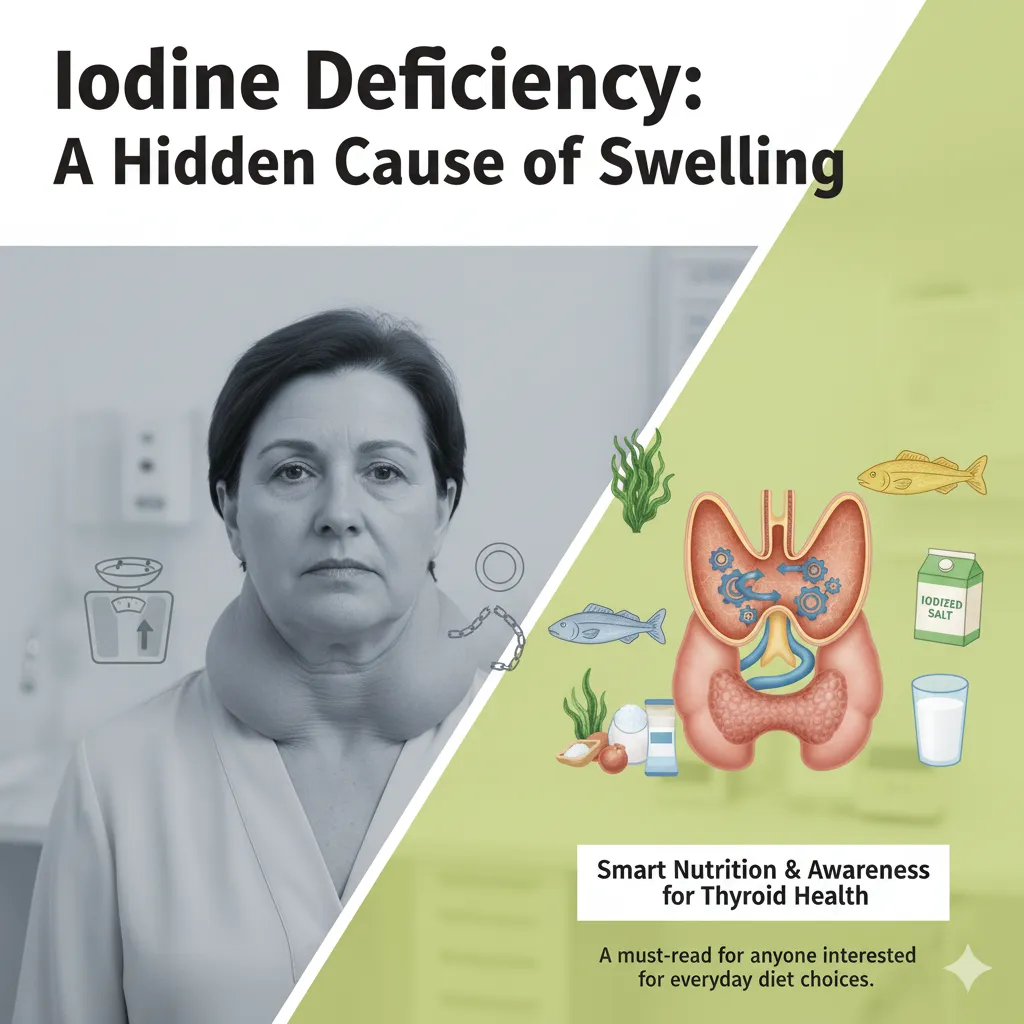
Seeing Is Believing: The Benefits of Ultrasound for Patients and Providers

Iodine Deficiency: The Hidden Cause of Swelling You Shouldn’t Ignore
Iodine Deficiency: The Hidden Cause of Swelling You Shouldn’t Ignore
When most people notice a swelling in their neck, they rarely think of iodine. But that small mineral, quietly doing its job in your body, plays an enormous role in keeping your thyroid gland—and your metabolism—healthy. A lack of it can cause the gland to enlarge, forming what’s known as a goiter. This isn’t just a cosmetic issue; it’s a warning sign from your body that something vital is missing.

Understanding Iodine and Its Role
Iodine is an essential trace element that your thyroid gland uses to produce hormones—thyroxine (T4) and triiodothyronine (T3). These hormones control how fast your body burns calories, your heart rate, temperature regulation, and even brain development. Without enough iodine, your thyroid can’t make these hormones efficiently, triggering a chain reaction that leads to swelling.
When iodine levels drop, the brain releases more thyroid-stimulating hormone (TSH) to push the thyroid to work harder. The thyroid responds by enlarging in an attempt to trap more iodine. Over time, this leads to the visible swelling at the base of your neck.

Common Symptoms of Iodine Deficiency
The signs can be subtle at first, often mistaken for general fatigue or stress. Look for:
Swelling at the front of the neck (goiter)
Fatigue or weakness
Weight gain or difficulty losing weight
Dry skin and hair loss
Cold intolerance
Brain fog or difficulty concentrating
In severe cases, especially during pregnancy, iodine deficiency can lead to developmental issues in children, including cretinism—a condition involving stunted physical and mental growth.
Why Iodine Deficiency Still Exists
You’d think in a modern world with fortified salt, iodine deficiency would be a relic of the past. Unfortunately, it’s making a quiet comeback. Why?
Many people now prefer “natural” or gourmet salts like sea salt or Himalayan salt, which often contain little to no iodine.
Processed foods—though often high in sodium—rarely use iodized salt.
Certain regions still have iodine-poor soil, so locally grown food lacks adequate iodine.
Diets that limit dairy or seafood can lead to deficiency, as these are major iodine sources.
Who Is Most at Risk
Some groups are more vulnerable than others:
Pregnant and breastfeeding women – They need higher iodine levels for fetal and infant brain development.
People on restrictive diets – Especially vegan or low-sodium diets.
Those living in iodine-deficient regions – Particularly inland or mountainous areas.
Individuals with thyroid disorders – They may need precise iodine balance for medication to work effectively.
How to Prevent Iodine Deficiency
The fix is simple but strategic.
Use iodized salt, but don’t overdo it—too much sodium has its own risks.
Eat iodine-rich foods like seafood, eggs, yogurt, and seaweed.
Check your supplements—not all multivitamins contain iodine.
If you suspect a deficiency, get tested. A thyroid function test and urinary iodine test can reveal the truth quickly.
When to See a Doctor
If you notice swelling around your neck, fatigue, or unexplained weight changes, don’t ignore it. These symptoms could signal a thyroid problem tied to iodine deficiency. A healthcare provider can evaluate your thyroid and help restore balance before it leads to more serious health issues.
Final Thoughts
Iodine may be a small nutrient, but its impact is immense. In a world obsessed with cutting salt and chasing health trends, it’s easy to forget that sometimes, the smallest things matter most. Keeping your iodine intake in check protects your thyroid, your metabolism, and your overall vitality.
For those seeking expert ultrasound services, Atlanta Ultrasound offers quick, efficient, and comprehensive scans. Our team of skilled professionals is dedicated to providing you with the clarity and care you need.
Contact us today to schedule your ultrasound scan and take a decisive step towards understanding your health.
📍 Multiple locations in Metro Atlanta, GA
📞 Contact: 678-590-3300
🌐 Website:www.atlantaultrasound.com
Disclaimer: The content of this blog post, authored by a sonographer, is provided for educational and informational purposes only. It is not intended as medical advice, nor should it substitute for professional medical consultation, diagnosis, or treatment. Always seek the advice of your physician or other qualified health providers with any questions you may have regarding a medical condition or health concerns.
